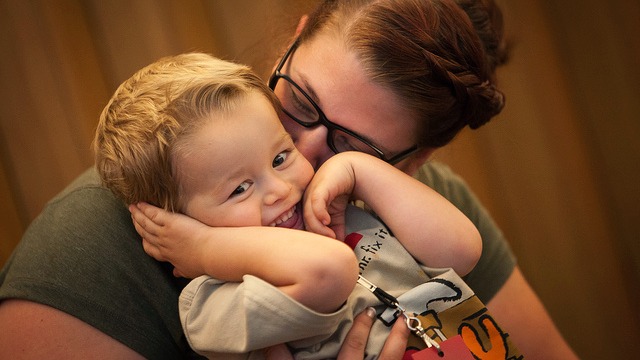For the first two years of my son’s life, I felt like a complete failure.
As Rowan’s parents, Erik and I battled. We battled delayed speech. We battled meltdowns and tantrums that made no sense, even for a two-year-old. We battled his panic attacks in Target, Costco, and the grocery store. We battled self-injury. We battled each other because we didn’t understand how to parent our kid.
We finally asked ourselves, “What’s happening here?” Was Rowan just an unusually difficult child, or was it something else? For too long, we battled against something that didn’t have a name. But, after a series of appointments, tests, and evaluations, we found one: autism spectrum disorder, or ASD.
Chances are, you know someone affected by autism. This month is Autism Awareness Month, so parents like me are blogging and posting on social media about the disorder. With 1 in 68 children being diagnosed with ASD—and 1 in 42 boys—it’s becoming more common, the fastest-growing developmental disorder in the United States.
A neurological condition, autism can go unnoticed by onlookers, who might assume a child is merely misbehaved, unsocial, rude, awkward, or just plain weird. These traits can easily isolate the child and, sometimes, their whole family. Right now, there is no known medical cause of autism and no cure.
After our initial battle, and through our ongoing efforts to support our son, I’ve come to see the church as uniquely positioned to help spectrum families, both as a community resource and as a welcome, accommodating place on Sunday mornings. As the ASD diagnosis rate continues to grow, parents are grappling for help and desperate for encouragement.
Many children with autism struggle to process sensory experiences, new environments, or changes in routine, so what most people see as everyday situations, we parents see as potential triggers for fear and anxiety. Everywhere we go, we survey the lights, noise, and crowds: How many people does he have to walk by in order to get where we’re going? Where’s the closest exit if my kid has an anxiety attack? How many transitions between activities are we planning?
Given the statistics, whether you realize it or not, there’s a good chance that you have a family in your congregation who’s parenting a child with autism and running through these same questions as they enter your sanctuary. And there’s a good chance that you may be tempted to overlook their needs: the constant hum of ministry demands and Sunday gatherings require efficiency, consistency, and structure.
But if a congregation’s eyes are open to this reality, the ministry opportunity is surprisingly simple. The key is not expert knowledge about the disorder, but a willingness to be hospitable and flexible, two straightforward but profound ways to show the love of Christ to such families.
Some simple, but helpful steps churches can take include:
1. Meet and Greet
Ministry leaders can set up a time to gather with parents and kids with special needs to get to know their diagnoses and concerns. Are parents desperate for childcare? Are their kids isolated during Sunday school? Is the format of your kids’ ministry too overwhelming for their child? Does the simple act of walking through the crowd at church create anxiety in their child? Listening to families directly allows leaders and volunteers to recognize the specific needs of their congregation.
2. Sunday Buddies
A child with special needs will often require extra attention and care, beyond what a Sunday school teacher can provide in a class full of children. Additional volunteers, or even older students, can serve Sunday Buddies, partnering with a child for a Sunday service. The “buddy system” guarantees that the child won’t become isolated and alone in a crowd of other kids.
3. A Quiet Room
Try to find a safe, accessible space in your kids area—similar to a cry room or reading nook—where a child with autism or social anxiety can play quietly with some toys (and a Sunday Buddy!) away from the loud social buzz of the Sunday school environment.
4. Alternate Entrances
If there’s another way into your facility that would bypass large gatherings of people, designate that as a special needs entrance. That way, autism families or anyone who struggles with social anxiety can enter the church without the overwhelming stimulus of large crowds.
5. Monthly Childcare
Respite care is one of the greatest, yet under-served needs of the special needs community. Gather a group of volunteers to provide a couple of hours of childcare one night a month. Churches can host these nights in their buildings, which provide a safe and familiar environment for kids and their siblings. This is also an opportunity to serve the community at large. How beautiful would it be to see an entire church congregation provide respite care to the special needs community one night a month.
Just imagine how much it might impact these families and the witness for Christ if churches became known as places where families who live with the realities of autism and other special needs find kindness, patience, and understanding.
Nish Weiseth is a storyteller, speaker, advocate, and author of Speak: How Your Story Can Change the World (Zondervan, 2014). She lives in Salt Lake City, Utah, with her husband and two kids. She previously wrote for Her.meneutics about being “evangelical in Mormon territory.”









